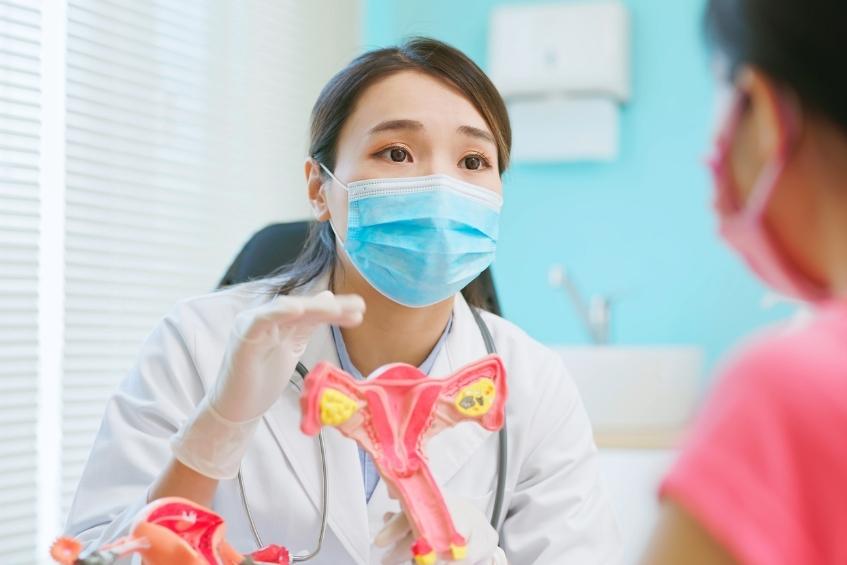
POLYCYSTIC ovary syndrome (PCOS) is the most common reproductive endocrine disease among women of childbearing age.
Although this condition has not received much publicity, it impacts many young women. In fact, 5% – 10% of teenagers and young women have this diagnosis.
In actuality, PCOS includes a spectrum of disorders rather than a single, discrete disease.
Women may experience a variety of signs and symptoms, and as a result, some of them may be inappropriately diagnosed with PCOS. In many women, the diagnosis is completely missed or even ignored.
One problematic aspect of PCOS is that there is no universally accepted definition of this disease. Most reproductive endocrinologists, however, require the presence of hyperandrogenism (excessive male hormones) and chronic anovulation (infrequent or absence of ovulation resulting in irregular menstrual cycles) to make the diagnosis.
Others require the appearance of multiple small ovarian cysts on a vaginal ultrasound examination.
Since other disorders of the ovary, pituitary gland and adrenal gland can mimic the symptoms and appearance of PCOS, these disorders should be excluded before an accurate diagnosis can be made.
Signs and Symptoms
The most common signs and symptoms are irregular periods, weight gain, acne and excess facial and body hair. The severity of symptoms varies. Most young women are generally distressed with how the symptoms impact their lives and self-esteem.
Many women with PCOS have trouble getting pregnant (because they do not ovulate regularly), but some women have no trouble at all.
Generally, symptoms of PCOS begin during the teenage years around the start of menstruation and can be mild or severe.
The extent of symptoms and their severity vary significantly.
What most gynaecologists agree on is that young women with this disorder have irregular menstrual cycles and have higher than normal levels of androgens (male hormones) in their blood.
Managing PCOS
The truth is, no one really knows what causes this disease. There is certainly a miscommunication between the hypothalamus (within the brain), pituitary gland (at the base of the brain), ovary and fatty tissue.
Where the miscommunication originates from is a matter of great controversy and remains unknown.
There is definitely a higher incidence of PCOS within certain families, but the genetic basis for the disease has not yet been fully elucidated.
There is no miracle cure for PCOS, but it can be treated. A healthy lifestyle that includes nutritious food and daily exercise can have a profound and positive effect on the endocrine system, particularly in cases where a young woman is overweight or obese.
Studies have shown that losing even 5% of body weight in overweight and obese women with PCOS can eliminate some of the symptoms associated with this disorder.
If you have PCOS, do not get frustrated if you are unable to lose weight quickly or if have been unsuccessful in losing weight. Learning how to choose and balance your carbohydrates and doing regular exercise will help.
It is important to stay positive as it can be very difficult to achieve visible results. Doing what's right for your body is good, even if you don't see a big change in your weight.
Eat a balanced diet because your body needs carbohydrates, protein and fat. If someone you know has PCOS, encourage her to choose nutritious, high-fibre carbohydrates instead of sugary carbohydrates.
Balance carbohydrates with protein and healthy fats, and eat small meals and healthy snacks during the day instead of three large meals.
Choose healthy carbohydrate foods that are high in fibre and low in sugar, and load up on vegetables and fruits. They are high in fibre and packed with vitamins and minerals.
Also remember to balance carbohydrate food with non-carbohydrate food and limit portions when eating high-carbohydrate food (especially ones that are low in fibre).
If you are still hungry at the end of the meal, try eating extra vegetables or extra protein food like meat, fish, eggs, or beans.
Satisfy your sweet tooth with fruit. However, small portions of treats can be included occasionally, too.
Take Control
Do not forget to exercise. Good nutrition is important, but it isn't enough. You also need to exercise regularly.
Adding exercise or increasing the exercise you already do will help you manage PCOS. Exercise regularly to help manage insulin levels and your weight.
More importantly, talk to your doctor about managing your PCOS. Most young women with PCOS need to take medication, even with good nutrition and exercise. If you have more questions about PCOS and nutrition, ask your doctor about talking to a nutritionist who has experience in working with teens with PCOS.
Polycystic Ovary Syndrome
Common signs
Less common signs

Wait a minute

Wait a minute